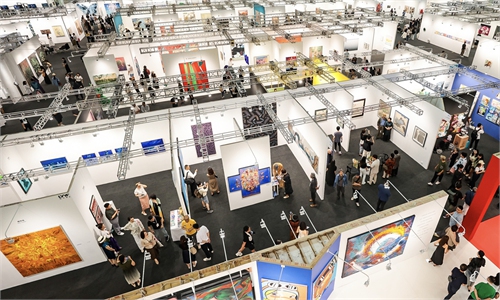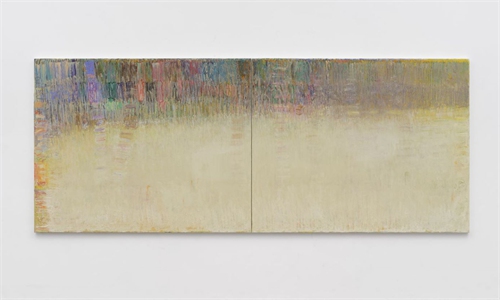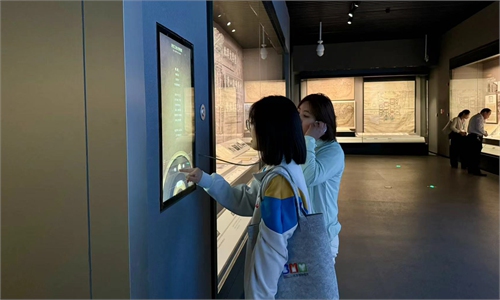ARTS / CULTURE & LEISURE
Spectacular photos wow visitors at ‘BRICS Universe’ exhibition
Space pictures from Russian cosmonauts a hit
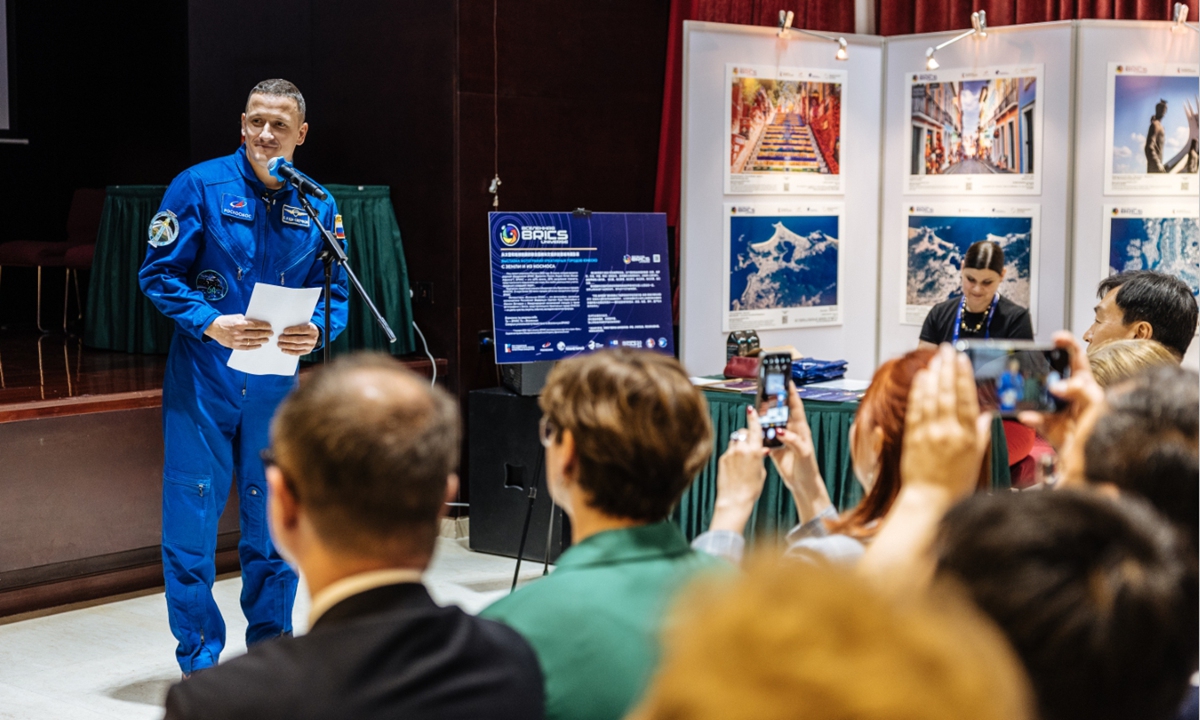
Russian cosmonaut Sergey Kud-Sverchkov speaks at the opening ceremony of The BRICS Universe exhibition in Beijing on May 29, 2024. Photo: Li Hao/GT
Spectacular photos presented at The BRICS Universe wowed visitors at the Russian Cultural Centre in Beijing on Wednesday.
The photography exhibition, one of a larger series, is showcasing photos of UNESCO Creative Cities in BRICS countries, notably some taken by two Russian cosmonauts, Sergey Kud-Sverchkov and Ivan Vagner, from the International Space Station.
The exhibition presents more than 600 photos from nearly 90 photographers, including the two Russian cosmonauts.
"Any cosmonaut would like to capture a photo that is close to his or her hometown or country, that's why we keep the camera close to us and were keen to capture a perfect picture. However, it is not so easy to capture a perfect photo from space," said Kud-Sverchkov in a speech at the opening ceremony.
"Through this project, we hope to allow the audience to forget about country boundaries temporarily and appreciate all the uniqueness of human civilization," he noted.
"Each country has its own characteristics and beauty. I would be very interested in taking photos of BRICS countries if I was offered to do so on the Chinese space station," Kud-Sverchkov told the Global Times.
The BRICS Universe was initiated in Russia, one of the members of the initial BRIC group, in 2022.
From the perspective of space, these spectacular photos showcase various aspects of life in BRICS countries, which represent more than 40 percent of the world's population and 30 percent of the global landmass.
"This humanistic project will bring together photos of the wonders of the Earth taken by Russian astronauts from the International Space Station and the most beautiful cities of the BRICS countries taken by professional photographers from space and the Earth. Russia fully supports this initiative aimed at deepening the friendship and mutual understanding between the people of our countries," said Natalia Stepkina, minister-counsellor, permanent representative to the Shanghai Cooperation Organisation Secretariat.
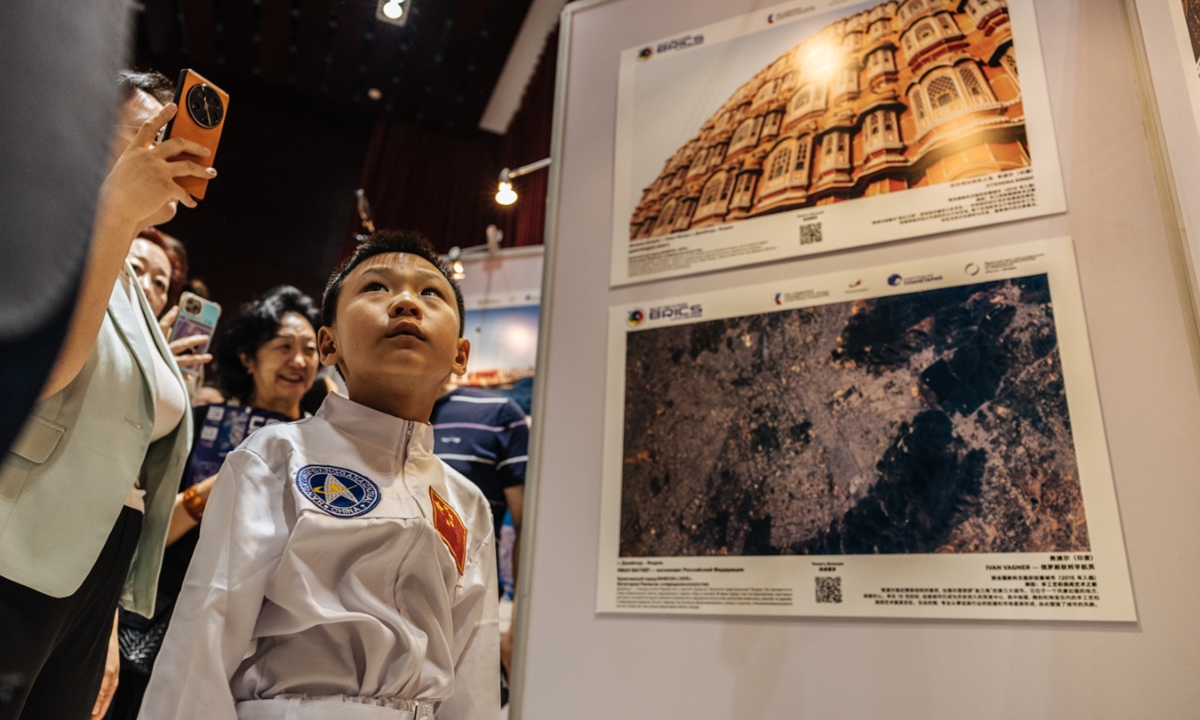
Visitors explore The BRICS Universe exhibition in Beijing on May 29, 2024. Photo: Li Hao/GT
On January 1, Russia took over the baton of the rotating presidency of BRICS. According to the resolution adopted by the BRICS leaders summit in 2023, the BRICS Alliance currently includes 10 countries, with Egypt, Iran, the United Arab Emirates, Saudi Arabia and Ethiopia officially becoming new members of BRICS."As BRICS has more countries to join and the group expands from its initial five countries, I will take more photos of more countries to share their cultures with the world," said Kud-Sverchkov.
Our planet is so beautiful, I would like to take more photos of the cities in these new member countries, and show them to the whole world, said the Russian cosmonaut.
At this exhibition, you can see the same place from two perspectives, one from ordinary people's point of view and the other from space some 400 kilometers above the Earth, Kud-Sverchkov added.
During the launch ceremony, the Russian cosmonaut talked about his life on the ISS via a video clip.
A signing ceremony for cooperation between the Nizhny Novgorod Planetarium and Beijing Planetarium was also held at the event.
Qi Rui, deputy director of the Beijing Planetarium, shared his thoughts on the cooperation.
"This exhibition is a visual feast that crosses countries and connects the soul. It stimulates the love of astronomy and enhances scientific and technological exchanges and cultural understanding among BRICS countries," Qi said.
"Over the past 20 years, the cooperation between BRICS countries has deepened in all aspects. Cooperation with the Nizhny Novgorod Planetarium will take scientific and technological exchanges and cooperation between the two countries to a new level."
The BRICS Universe project consists of 10 exhibitions. The first kicked off on February 1 at the Memorial Museum of Cosmonautics in Moscow, the series has been continuing its journey through the nine UNESCO Creative Cities - St. Petersburg, Rio de Janeiro, Kargopol, Beijing, Nizhny Novgorod, Ulyanovsk, Mumbai, Durban, and Kazan. It is scheduled to run until the end of October.
In 2021, BRICS countries signed the Agreement on Remote Sensing Satellite Constellation Cooperation. Remote sensing satellite data sharing helps achieve many goals, including combating natural disasters and providing information support for economic and social development, Stepkina introduced.
"As you can see, we have a lot of common affairs in space. The cooperation of BRICS countries in this regard is very much needed, including activities like today. On the one hand, these activities make us think about the beauty and strength of our common home Earth, and on the other hand, let us think about its fragility!" said Stepkina.
During a quick discussion with a Chinese photographer, Kud-Sverchkov noted that he used common equipment, such as an 80-centimeter lens, to take the photos. He mentioned he is aware that his Chinese peers have also taken many beautiful phones from China's Tiangong Space Station.
